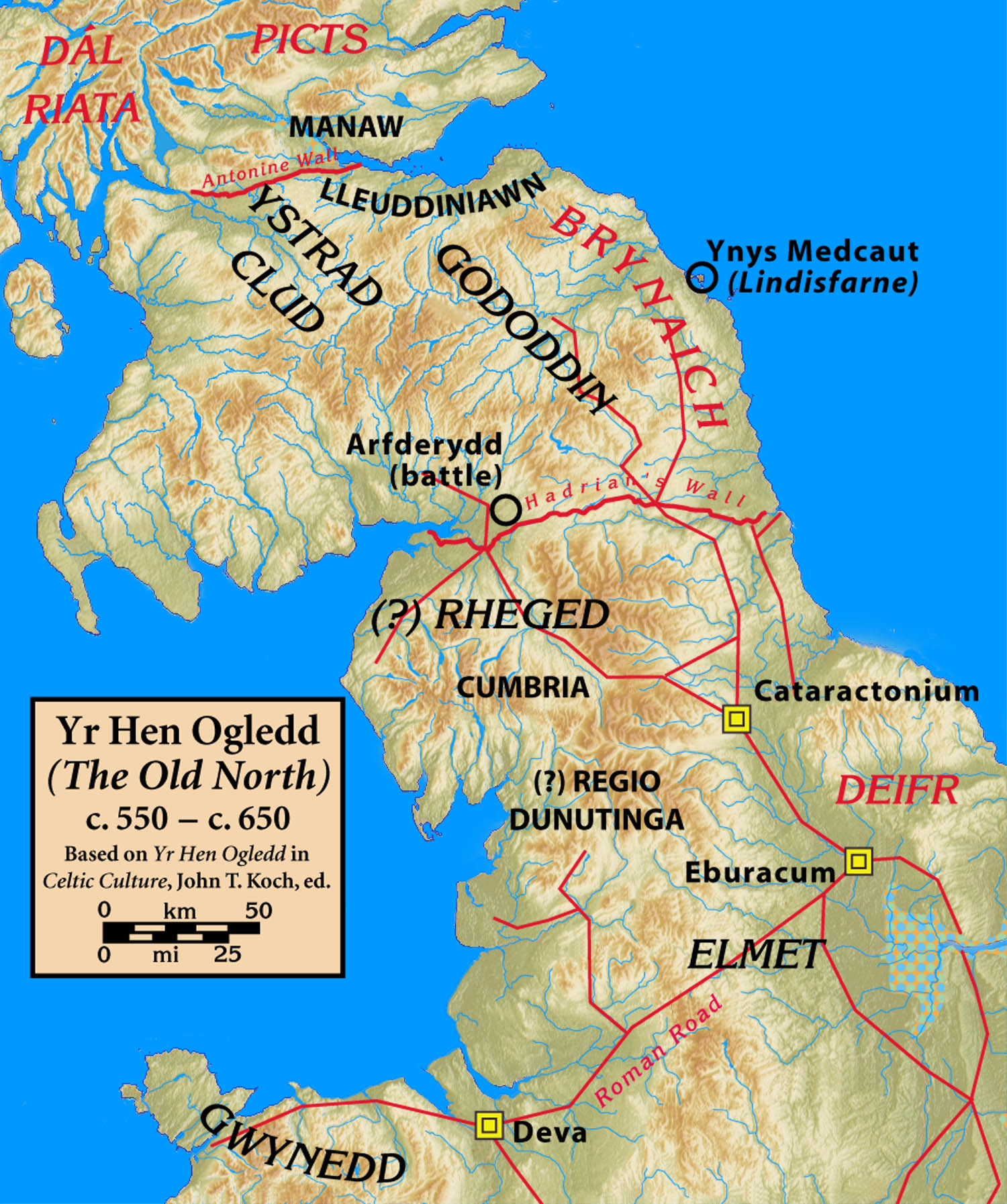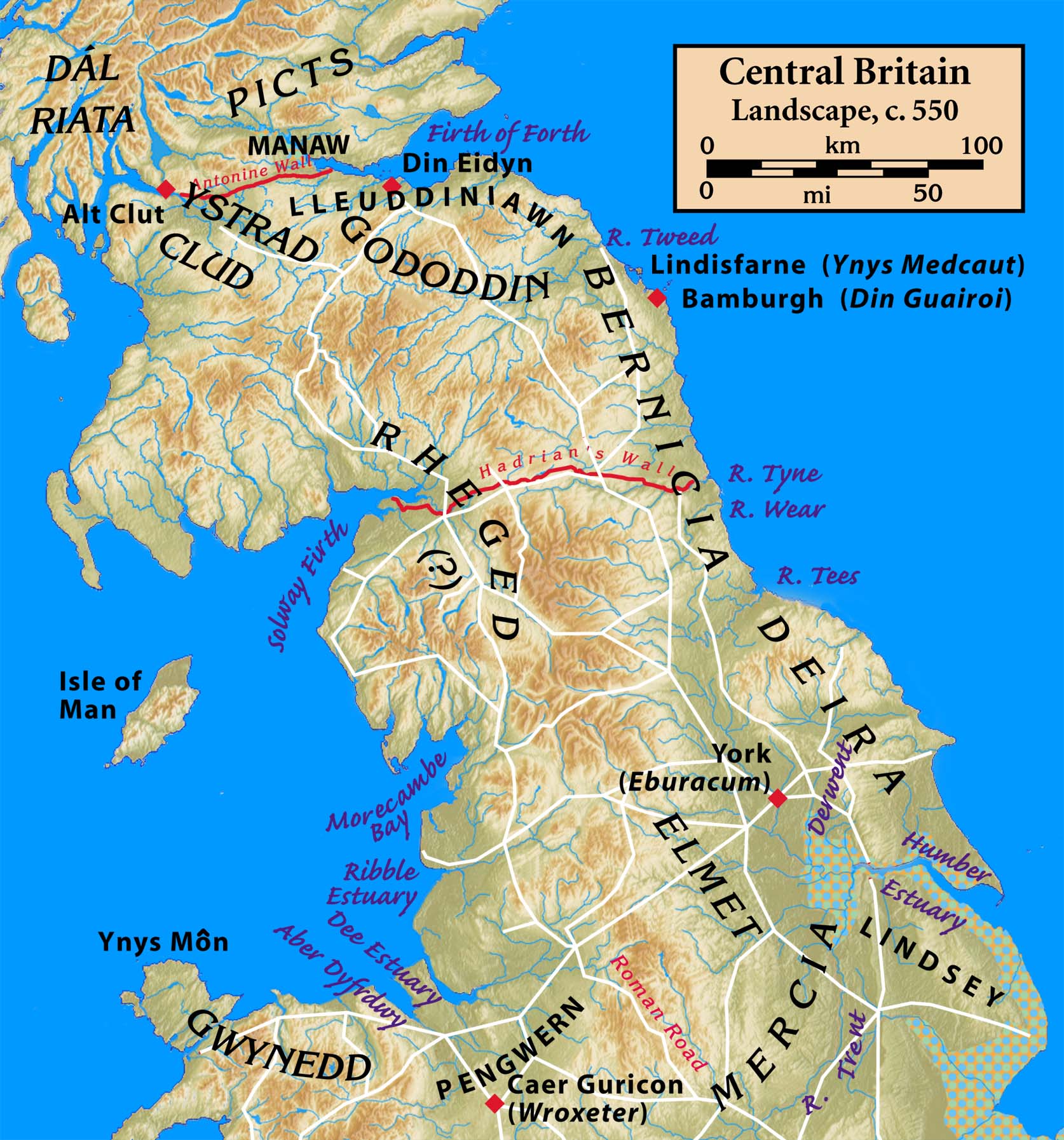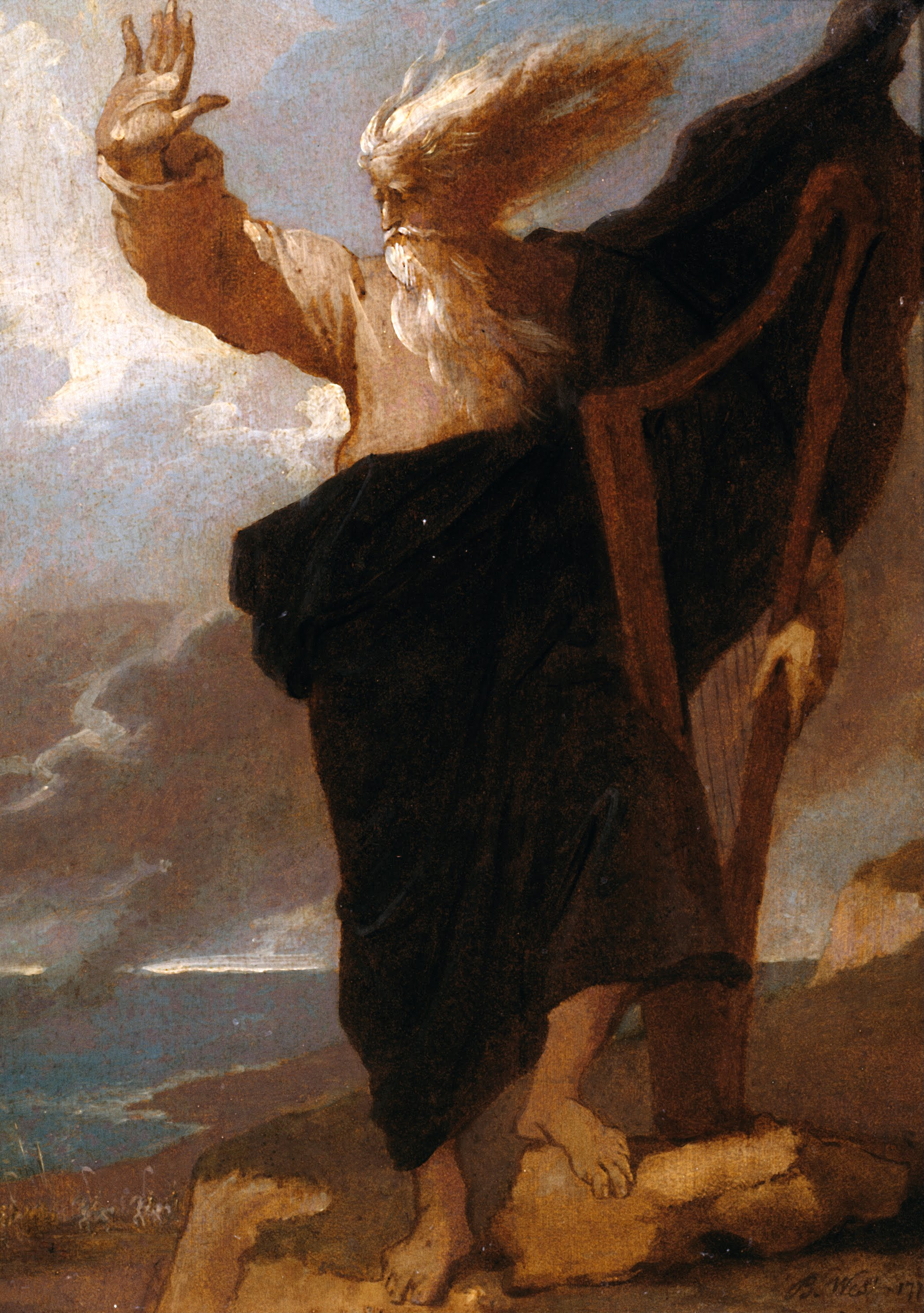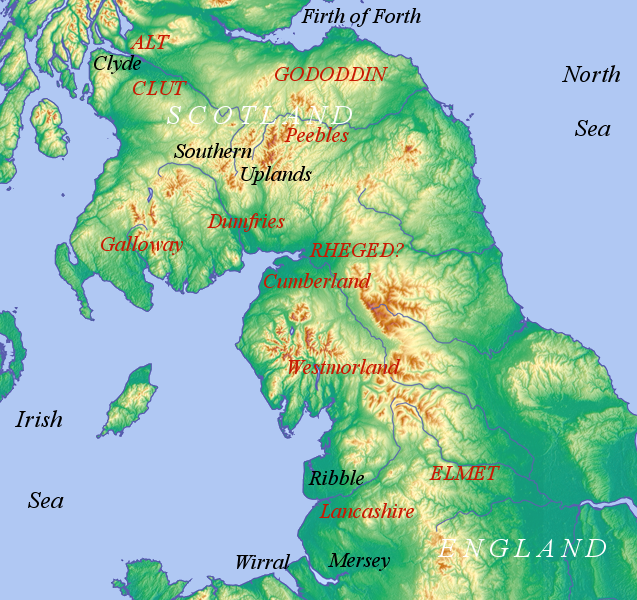|
Aneirin
Aneirin (), also rendered as Aneurin or Neirin and Aneurin Gwawdrydd, was an early Medieval Brythonic war poet who lived during the 6th century. He is believed to have been a bard or court poet in one of the Cumbric kingdoms of the Hen Ogledd, probably that of Gododdin at Edinburgh, in modern Scotland. From the 17th century, he was usually known as Aneurin. Life Some records indicate that Aneirin was the son of Caunus (or Caw) and brother to Gildas. According to this version of his life, he was born at Dumbarton on the River Clyde. However, some scholars debate this parentage, and contend that these records are of later invention and are erroneous. Whoever his father was, Aneirin's mother, Dwywei is mentioned in '' Y Gododdin''. She may be the same lady who, according to Old Welsh pedigrees, married King Dunod who is generally thought to have ruled in the West Riding of Yorkshire. He may also be kin to another Brythonic poet, Cian Gwenith Gwawd. Aneirin's patrons were the no ... [...More Info...] [...Related Items...] OR: [Wikipedia] [Google] [Baidu] |
Urien
Urien ap Cynfarch Oer () or Urien Rheged (, Old Welsh: or , ) was a powerful sixth-century Brittonic-speaking figure who was possibly the ruler of the territory or kingdom known as Rheged. He is one of the best-known and best documented of the British figures of the ' Old North'. His kingdom was most likely centred around the Solway Firth. According to the ''Historia Brittonum'' (), Urien gained the decisive advantage in a conflict against the Anglo-Saxons in northern Britain led an alliance with three other kings: Rhydderch Hen, Gwallog ap Llênog, and Morgan. The alliance led by Urien penned the Anglo-Saxons in at Lindisfarne, though this siege came to an abrupt end when Urien was murdered on the orders of his erstwhile ally Morgan. The most secure evidence for his existence comes the ''Historia Brittonum'' and eight praise-poems in Middle Welsh dedicated to him surviving in a fourteenth-century manuscript. Despite their being found in Middle Welsh orthography, t ... [...More Info...] [...Related Items...] OR: [Wikipedia] [Google] [Baidu] |
Y Gododdin
''Y Gododdin'' () is a medieval Welsh poem consisting of a series of elegies to the men of the Brittonic kingdom of Gododdin and its allies who, according to the conventional interpretation, died fighting the Angles of Deira and Bernicia at a place named '' Catraeth'' in about AD 600. It is traditionally ascribed to the bard Aneirin and survives only in one manuscript, the " Book of Aneirin". The Book of Aneirin manuscript is from the later 13th century, but ''Y Gododdin'' has been dated to between the 7th and the early 11th centuries. The text is partly written in Middle Welsh orthography and partly in Old Welsh. The early date would place its oral composition soon after the battle, presumably in the ''Hen Ogledd'' ("Old North"); as such it would have originated in the Cumbric dialect of Common Brittonic.Elliott (2005), p. 583. Others consider it the work of a poet from Wales in the 9th, 10th, or 11th century. Even a 9th-century date would make it one of the oldest surv ... [...More Info...] [...Related Items...] OR: [Wikipedia] [Google] [Baidu] |
Book Of Aneirin
The Book of Aneirin () is a late 13th century Welsh manuscript containing Old and Middle Welsh poetry attributed to the late 6th century Northern Brythonic poet, Aneirin, who is believed to have lived in present-day Scotland. The manuscript is kept at the National Library of Wales, Aberystwyth. It is made of parchment and was written in Wales around 1265, probably in a monastery, but is probably a copy of a lost 9th century original. The text of the manuscript is rendered in a proto-gothic hand. There is minimal decoration, consisting of only of a few colored Lombardic Capitals. Paragraphs are broken by similarly colored pilcrows and where the text breaks before the right margin, simple illustrated linear termini are provided. The poetry recorded in the book, which has only 38 pages, would previously have been kept alive through oral tradition. The best-known poem contained within its pages is ''Y Gododdin'', an early Welsh-language poem commemorating the warriors from Godo ... [...More Info...] [...Related Items...] OR: [Wikipedia] [Google] [Baidu] |
Talhaearn Tad Awen
Talhaearn Tad Awen (''fl'' mid-6th century), was, according to medieval Welsh sources, a celebrated British poet of the sub-Roman period. He ranks as one of the earliest, if not the earliest, named poets to have composed and performed in Welsh. The better known poets Aneirin and Taliesin, who may have been slightly younger contemporaries, also belong to this early generation, the first of those known to modern scholars as the '' Cynfeirdd'' ("first poets"). Whereas medieval Welsh manuscripts preserve verse composed by or otherwise ascribed to the latter two figures, no such work survives for Talhaearn and in fact, his former fame seems to have largely vanished by the later Middle Ages. ''Historia Brittonum'' An interpolated passage in the ''Historia Brittonum'' (9th century) describes him as a famous poet, along with Aneirin, Taliesin and two lesser known figures, Blwchfardd and Cian: :''Tunc Talhaern Tat Aguen in poemate claruit, et Neirin, et Taliessin, et Bluchbard, et Cian q ... [...More Info...] [...Related Items...] OR: [Wikipedia] [Google] [Baidu] |
Hen Ogledd
Hen Ogledd (), meaning the Old North, is the historical region that was inhabited by the Celtic Britons, Brittonic people of sub-Roman Britain in the Early Middle Ages, now Northern England and the southern Scottish Lowlands, alongside the fellow Brittonic Celtic Elmet, Kingdom of Elmet, in Yorkshire. Its population spoke a variety of the Brittonic languages, Brittonic language known as Cumbric which is closely related to, if not a dialect of Old Welsh. The Welsh people, people of Wales and the Hen Ogledd considered themselves to be one people, and both were referred to as Cymry ('fellow-countrymen') from the Brittonic word ''combrogi''. The Hen Ogledd was distinct from the parts of Great Britain inhabited by the Picts, Anglo-Saxons, and Scoti. The major kingdoms of the Hen Ogledd were Elmet, Gododdin, Rheged, and the Kingdom of Strathclyde (Welsh: ''Ystrad Clud''). Smaller kingdoms included Aeron (kingdom), Aeron and Calchfynydd. Eidyn, Lothian, Lleuddiniawn, and Manaw Gododdin ... [...More Info...] [...Related Items...] OR: [Wikipedia] [Google] [Baidu] |
Battle Of Catraeth
The Battle of Catraeth was fought around AD 600 between a force raised by the Gododdin, a Brythonic people of the ''Hen Ogledd'' or "Old North" of Britain, and the Angles of Bernicia and Deira. It was evidently an assault by the Gododdin party on the Angle stronghold of Catraeth, perhaps Catterick, North Yorkshire. The Gododdin force was said to have consisted of warriors from all over the Hen Ogledd, and even some from as far afield as Gwynedd in North Wales and Pictland. The battle was disastrous for the Britons, who were nearly all killed. The slain warriors were commemorated in the important early poem ''Y Gododdin'', attributed to Aneirin. Battle In his ''Canu Aneirin'' Ifor Williams interpreted ''mynydawc mwynvawr'' in the text of ''Y Gododdin'' to refer to a person, Mynyddog Mwynfawr in modern Welsh. Mynyddog, in Williams' reading, was the king of the Gododdin, with his chief seat at Din Eidyn (modern Edinburgh). Around the year 600 Mynyddog gathered about 300 ... [...More Info...] [...Related Items...] OR: [Wikipedia] [Google] [Baidu] |
Bard
In Celtic cultures, a bard is an oral repository and professional story teller, verse-maker, music composer, oral historian and genealogist, employed by a patron (such as a monarch or chieftain) to commemorate one or more of the patron's ancestors and to praise the patron's own activities. With the decline of a living bardic tradition in the modern period, the term has loosened to mean a generic minstrel or author (especially a famous one). For example, William Shakespeare and Rabindranath Tagore are respectively known as "the Bard of Avon" (often simply "the Bard") and "the Bard of Bengal". Oxford Dictionary of English, s.v. ''bard'', n.1. In 16th-century Scotland, it turned into a derogatory term for an itinerant musician; nonetheless it was later romanticised by Sir Walter Scott (1771–1832). Etymology The English term ''bard'' is a loan word from the Celtic languages: Gaulish: ''bardo-'' ('bard, poet'), and ('bard, poet'), ('singer, poet'), Middle Breton: ''b ... [...More Info...] [...Related Items...] OR: [Wikipedia] [Google] [Baidu] |
Taliesin
Taliesin ( , ; 6th century AD) was an early Britons (Celtic people), Brittonic poet of Sub-Roman Britain whose work has possibly survived in a Middle Welsh manuscript, the ''Book of Taliesin''. Taliesin was a renowned bard who is believed to have sung at the courts of at least three kings. Taliesin means "shining brow" in Welsh. In 1960, Ifor Williams identified eleven of the medieval poems ascribed to Taliesin as possibly originating as early as the sixth century, and so possibly being composed by a historical Taliesin. The bulk of this work praises King Urien Rheged, Urien of Rheged and his son Owain mab Urien, although several of the poems indicate that Taliesin also served as court bard to King Brochfael Ysgithrog of kingdom of Powys, Powys and his successor Cynan Garwyn, either before or during his time at Urien's court. Some of the events to which the poems refer, such as the Battle of Arfderydd (), are referred to in other sources. John T. Koch argues that the descri ... [...More Info...] [...Related Items...] OR: [Wikipedia] [Google] [Baidu] |
Bernicia
Bernicia () was an Anglo-Saxon kingdom established by Anglian settlers of the 6th century in what is now southeastern Scotland and North East England. The Anglian territory of Bernicia was approximately equivalent to the modern English counties of Northumberland, Tyne and Wear, and Durham, as well as the Scottish counties of Berwickshire and East Lothian, stretching from the Forth to the Tees. In the early 7th century, it merged with its southern neighbour, Deira, to form the kingdom of Northumbria, and its borders subsequently expanded considerably. Etymologies Bernicia occurs in Old Welsh poetry as ''Bryneich'' or ''Byrneich'' and in the 9th-century '' Historia Brittonum'', (§ 61) as ''Berneich'', ''Birneich'', ''Bernech'' and ''Birnech''. Academics agree the name was originally Celtic. This name was then adopted by the Anglian settlers who rendered it in Old English as ''Bernice'' (Northumbrian dialect) or ''Beornice'' (West Saxon dialect). The counter hypothesis ... [...More Info...] [...Related Items...] OR: [Wikipedia] [Google] [Baidu] |
War Poet
War poetry is poetry on the topic of war. While the term is applied especially to works of the First World War, the term can be applied to poetry about any war, including Homer's ''Iliad'', from around the 8th century BC as well as poetry of the American Civil War, the Spanish Civil War, the Crimean War and other wars. List of war poets, War poets may be combatants or noncombatants. Ancient times ''The Iliad'' is an epic poem in dactylic hexameter which is believed to have been composed by Homer, a blind Greek Bard from Ionia. It is among the oldest surviving works of Western literature, believed to have begun as oral literature. The first written form is usually dated to around the 8th century BC. The ''Iliad'' is set during the ten-year Trojan War, siege of the polis of Troy (Ilion (Asia Minor), Ilium), ruled by King Priam and his sons Hector and Paris (mythology), Paris, by a massive army from a coalition of Greek states led by King Agamemnon of Mycenae. The events between ... [...More Info...] [...Related Items...] OR: [Wikipedia] [Google] [Baidu] |
Cumbric
Cumbric is an extinct Celtic language of the Brittonic subgroup spoken during the Early Middle Ages in the ''Hen Ogledd'' or "Old North", in Northern England and the southern Scottish Lowlands. It was closely related to Old Welsh and the other Brittonic languages. Place-name evidence suggests Cumbric may also have been spoken as far south as Pendle and the Yorkshire Dales. The prevailing view is that it became extinct in the 12th century, after the incorporation of the Kingdom of Strathclyde into the Kingdom of Scotland. Problems with terminology Dauvit Broun sets out the problems with the various terms used to describe the Cumbric language and its speakers.Broun, Dauvit (2004): 'The Welsh identity of the kingdom of Strathclyde, ca 900-ca 1200', ''Innes Review'' 55, pp 111–80. The people seem to have called themselves the same way that the Welsh called themselves (most likely from reconstructed Brittonic meaning "fellow countrymen"). The Welsh and the Cumbric-speaki ... [...More Info...] [...Related Items...] OR: [Wikipedia] [Google] [Baidu] |
Gododdin
The Gododdin () were a Brittonic people of north-eastern Britannia, the area known as the Hen Ogledd or Old North (modern south-east Scotland and north-east England), in the sub-Roman period. Descendants of the Votadini, they are best known as the subject of the 6th-century Welsh poem '' Y Gododdin'', which memorialises the Battle of Catraeth and is attributed to Aneirin. The name ''Gododdin'' is the Modern Welsh form, but the name appeared in Old Welsh as ''Guotodin'' and derived from the tribal name '' Votadini'' recorded in Classical sources, such as in Greek texts from the Roman period. Kingdom It is not known exactly how far the kingdom of the Gododdin extended, possibly from the Stirling area to the kingdom of '' Bryneich'' (Bernicia), and including what are now the Lothian and Borders regions of eastern Scotland. It was bounded to the west by the Brittonic Kingdom of Strathclyde, and to the north by the Picts. Those living around Clackmannanshire were known as ... [...More Info...] [...Related Items...] OR: [Wikipedia] [Google] [Baidu] |






